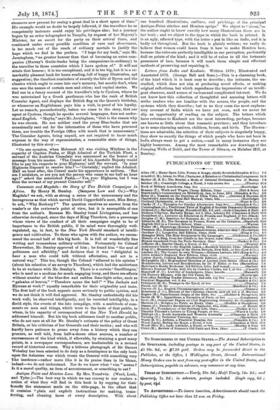Coomassie and Magdala : the Story of Two British Campaigns
in Africa. By Henry M. Stanley. (Sampson Low and Co.)—Why Magdala? we ask, with as strong a sense of the unnecessary and the Incongruous as that which moved David Copperfield's aunt, Miss Betsy, to ask, "Why Rookery?" The question receives no answer from the reader's or the reviewer's point of view, but it is susceptible of one from the author's. Because Mr. Stanley found Livingstone, and has otherwise developed, since the clays of King Theodore, into a personage whose views of the conduct of all their campaigns ought to be of importance to the British public, if its mind were thoroughly well- regulated, up, in fact, to the New York Herald standard of intelli- gence and cultivation. To those who agree with the author, we recom- mend the second half of this big book. It is full of wonderfully fine writing and tremendous military criticism. Fortunately for Colonel Merewether, Mr. Stanley approved of him ; he found him "the soul of politeness and affability," and declares that it was "delightful to hear a man who could talk without affectation, and act in a natural way." This too, though the Colonel "adhered to his opinion" (about his selection of an envoy to Theodore), which had the misfortune to be at variance with Mr. Stanley's. There is a certain Smellfungus; who is used as a medium for much engaging irony, and there are effects without number of the blue-fire and sudden lime-light order, such as -"galaxies of braves," "Theodore opens the ball!" "The Jackals and Hya3nas at work!" equally remarkable for their originality and taste. The first half of the book appeals more seriously to public opinion, and we do not think it will find approval. Mr. Stanley undoubtedly did his work well; he observed intelligently, and he recorded intelligibly, in a florid style, the events of the late camplign, with a multitude of com- ments on men and things, which were to the taste of that public, to whom, in his capacity of correspondent of the New York Herald, he addressed himself. But his big book addresses itself to another public, who do not care at all for Mr. Stanley's estimate of the policy of Great Britain, or his criticism of her Generals and their tactics ; and who will hardly have patience to prune away from a history which they can procure, as well told, from half-a-dozen other sources, a number of excrescences of the kind which, if allowable, by straining a good many points, in a newspaper correspondence, are inadmissible in a revised record of historical events. Why a hideous photograph of Sir Garnet Wolseley has been selected to do duty as a frontispiece to the only book mien the Aahantee war which treats the General with something very like insolence—rather more like it in its praise than in its blame, indeed—we do not understand. Nor do we know what "vim " means ? Is it a moral quality, an item of accoutrement, or something to eat?


































 Previous page
Previous page